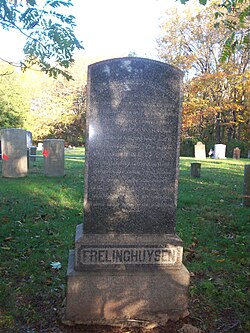Theodorus Jacobus Frelinghuysen
| Theodorus Jacobus Frelinghuysen | |
|---|---|

Cenotaph in Elm Ridge Cemetery, North Brunswick erected in 1884
|
|
| Born |
c. 1691 Lingen, East Freesland |
| Died |
c. 1747 Franklin Township, Somerset County, New Jersey |
| Occupation | Theologian |
| Spouse(s) | Eva Terhune (~1696- ~1750) |
| Children | Theodorus (1723–1760) John (1727–1754) Jacobus (c.1730–1753) Ferdinandus (c.1732–1753) Henricus (c.1735–1757) Margaret (1737–1757) Anna (1738–1810) |
| Parent(s) | Johannes Henrich Frelinghaus and Anna Margaretha Brüggemann Frelinghaus (1657–1728) |
Theodorus Jacobus Frelinghuysen (c. 1691 – c. 1747) was a German-American Dutch-Reformed minister, theologian and the progenitor of the Frelinghuysen family in the United States of America. Frelinghuysen is most remembered for his religious contributions in the Raritan Valley during the beginnings of the First Great Awakening. Several of his descendants became influential theologians and politicians throughout American history.
He was born in Lingen, East Friesland, to Johann Henrich Frelinghaus, a German-Reformed minister; and to Anna Margaretha Brüggemann Frelinghaus (1657–1728). Frelinghuysen was graduated from the University of Lingen in 1717, and he was ordained as a minister of the German Reformed Church in 1715. For fourteen months he was a minister in Loegumer Voorwerk, in East Friesland, and then for a short time he was co-rector of the Latin school in Enkhuizen, in the Netherlands. In June 1719 he accepted a call from Raritan, in the Province of New Jersey, a British colony in North America, and after a re-ordination for the Dutch Reformed Church by the Classis of Amsterdam, he arrived in America in January 1720.
He married Eva Terhune (c. 1696-c. 1750), daughter of Jan Terhune and Margrietje van Sicklen of Flatlands, Long Island, and had seven children:
All five sons became ministers and both daughters married ministers.
Frelinghuysen served as minister to several of the Reformed Dutch Churches (congregations at Raritan, New Brunswick, Six-Mile Run, Three-Mile Run, and North Branch) in the Raritan River valley of New Jersey which he served until his death in 1747 or 1748.
...
Wikipedia
